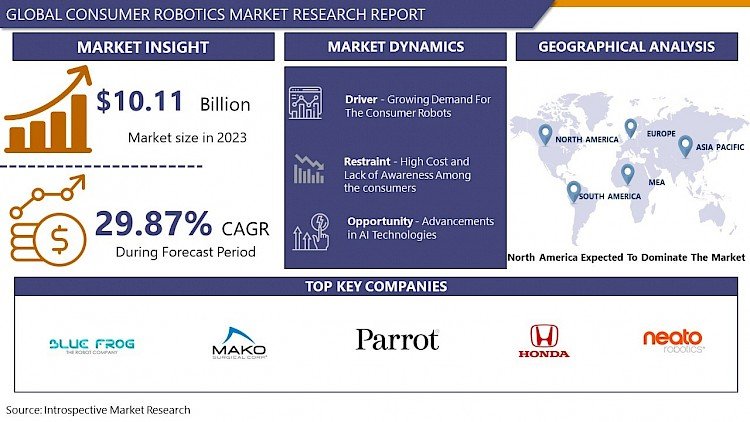Global Consumer Robotics Market Overview
The Global Consumer Robotics Market size is expected to grow from USD 10.11 billion in 2023 to USD 106.25 billion by 2032, at a CAGR of 29.87% during the forecast period (2024-2032).
Consumer robots and robotic gadgets are designed for everyday use, usually in a household or personal setting. Household robots, vacuum robots, lawn mowing robots, pool cleaning robots, and other robotic devices are among them. In 2016, robot vacuum cleaners accounted for 20% of all vacuum cleaners sold. They've risen to 23% in 2017 and are continuing to rise. Even though most people identify domestic robots with vacuum cleaners and Roombas, most traditional household product businesses have entered the robotics market. Robots used to be science fiction fantasies, but that is no longer the case. With worldwide spending on robots, the robotics market is taking off and will continue to rise. Consumer demand for autonomous and semi-autonomous robotic technology, as well as the expanding use of hand-held computer devices and internet penetration around the world, are all contributing to the global consumer robotics market's rise. Simultaneously, these robots provide humans with a better working environment, allowing them to complete tasks faster and more accurately. The incorporation of artificial intelligence and machine learning in robots has offered endless potential opportunities for the consumer robotics industry in this era of modernization.

Market Dynamics And Factors For Consumer Robotics Market
Drivers:
Growing Demand For The Consumer Robots
What was considered as a revolution at the beginning of 21 century when the first generation of consumer robots like vacuum cleaners and lawnmowers was introduced, is now pretty common technology. The next generation of consumer robots is emerging which is going beyond home care robots typically taking on a specific chore (de Bellis & Johar, 2020) to interactive connected personal assistants or family companions (Lum, 2020). Consumer robots integrate information technology into physical embodiments to make everyday life easier. The recent development of artificial intelligence (AI) in understanding and producing natural language, learning from experience, and even understanding and mimicking human emotions has fueled the rapid growth of robots. Further, the declining prices of robots and the growing demand for homecare due to the increasing elderly population have also propelled consumer robots market growth. In addition, the increasing use of various computing devices like smartwatches, tablets, smartphones, and others fuels the market demand in the global market. Moreover, increasing market demand for machine learning, tactile sensors, machine vision, gesture control, speech and voice recognition, human-robot interaction, artificial intelligence, and many others drives the market in the global market. Additionally, the wide use of sensors and Wi-Fi in consumer robotics also fuels the market growth in these regions.
Restraints:
Though the consumer robotics market is increasing tremendously in the global market some factors restrict its growth. The high cost associated with manufacturing consumer robotics and the high price charged by manufacturers hampers the market growth in the global market. Moreover, a lack of awareness of the availability of consumer robotics in various emerging countries and underdeveloped countries restricts the market growth in the global market.
Opportunities:
Artificial intelligence (AI) technologies, particularly machine learning (ML), are critical in the development of intelligent robots that can predict and react to specific situations based on the interpretation of data collected from a variety of sensors. To take industrial automation and industrial robots to the next level, more advancements in AI technologies such as computer vision, conversational platforms, and context-aware computing are required. Such technological advancements are projected to continue in the next years, with market potential.
Challenges:
The possibility of cyberattacks is one of the most significant obstacles to the widespread use of robots. Robots, particularly those that are connected to the internet, are extremely vulnerable to hacking. Allowing unauthorized access to important applications and systems by leaving them unprotected may result in the loss, theft, destruction, or inappropriate use of sensitive data.
Segmentation Analysis of Consumer Robotics Market
By Type, task robots are anticipated to register the maximum consumer robotics market share over the forecast period. The need for domestic robots is being driven by rising automation in household equipment, rising labor costs, and rising safety concerns around the world. One of the major factors driving the market is the growth in investments by firms around the world to create domestic robots for a variety of applications. Samsung and LG Electronics are heavily investing in the development and introduction of new robotic goods for the home. Jibo, for example, is developing social robots to integrate into people's daily lives as interactive companions. Startups that provide domestic robot solutions are also getting funding from overseas investors, based on the market potential.
By Connectivity, the Wifi segment is expected to grow at the highest compound annual growth rate as a result of the rising technological adoption resulting in a strong demand for the robots with enhanced speed. Furthermore, the development of smart cities, followed by its feature of easing management, will further attract many customers to the market.
By End-Users, the household robot is anticipated to dominate the consumer robotics market during the forecast period. The demand for household robots is being driven by rising automation in household appliances, rising labor costs, and rising safety concerns around the world. One of the major factors driving the market is the growth in investments by firms around the world to create domestic robots for a variety of applications. Samsung and LG Electronics are heavily investing in the development and introduction of new robotic goods for the home. Jibo, for example, is developing social robots to integrate into people's daily lives as interactive companions. Startups that provide domestic robot solutions are also getting funding from overseas investors, based on the market potential.
Regional Analysis of Consumer Robotics Market
North America region is holding a major share of the consumer robotics market over the forecast period. The expansion of the market is largely fueled by the United States and Canada. The expansion is being driven by the rising use of consumer robots in residential applications across the area. In the United States, there are several consumer robotics firms. iRobot, based in Bedford, Massachusetts, is the most well-known consumer robotics manufacturer in the United States. iRobot has grown significantly in recent years as they have developed and upgraded a variety of consumer robots. The Roomba Robotic Vacuum is the company's most well-known robot.
The Asia Pacific is expected to register a significant market share over the forecast period. In Asia, three countries, China, Japan, and South Korea are at the forefront of consumer robotics research and development. Because those three countries are Asia's leaders in robotics production, there is a wealth of knowledge available from them. The countries of China, Japan, and South Korea were chosen to represent the current state of consumer robotics in Asia.
The market in European countries has been steadily growing and is likely to continue to develop in the future years. Various companies are helping to expand new technologies and products, and this trend is projected to continue during the forecast period. There are robotic vacuums available from European businesses that are known for goods other than robots, similar to iRobot's Roomba. Electrolux, a Swedish manufacturer of household goods, has unveiled its version of a vacuum robot.
Key players in the Consumer Robotics Market
- Blue Frog Robotics (France)
- MAKO Surgical Corporation (US)
- Parrot SA (France)
- Honda Motors Company Ltd. (Japan)
- Neato Robotics (US)
- LG Electronics Inc. (South Korea)
- WowWee Group Limited (Hong Kong)
- Jibo Inc. (US)
- Hasbro Inc. (US)
- Samsung Electronics Co. Ltd. (South Korea)
- 3D Robotics (US)
- Intuitive Surgical Inc. (US)
- Google Inc. (US)
- iRobot Corporation (US) and other major players.
Key Industry Developments In Consumer Robotics Market
- In January 2024, Samsung announced the launch of household robot with the name Ballie. This spherical home robot is aimed at charming skeptical consumers who need a little extra help around the house.
- In December 2023, Amber Technology announced a strategic partnership with Robosen Robotics, the globally acclaimed creator of advanced consumer entertainment and education robots. This partnership will introduce Robosen’s state-of-the-art range of robots to the Australian and New Zealand markets, following the brand’s significant global achievements.
|
Global Consumer Robotics Market |
|||
|
Base Year: |
2023 |
Forecast Period: |
2024-2032 |
|
Historical Data : |
2017 to 2023 |
Market Size in 2023: |
USD 10.11 Bn. |
|
Forecast Period 2024-32 CAGR: |
29.87 % |
Market Size in 2032: |
USD 106.25 Bn. |
|
Segments Covered: |
By Type |
|
|
|
By Connectivity |
|
||
|
By Application |
|
||
|
By End-User |
|
||
|
By Region |
|
||
|
Key Market Drivers: |
|
||
|
Key Market Restraints: |
|
||
|
Opportunities |
|
||
|
Companies Covered in the report: |
|
||
Chapter 1: Introduction
1.1 Research Objectives
1.2 Research Methodology
1.3 Research Process
1.4 Scope and Coverage
1.4.1 Market Definition
1.4.2 Key Questions Answered
1.5 Market Segmentation
Chapter 2:Executive Summary
Chapter 3:Growth Opportunities By Segment
3.1 By Type
3.2 By Connectivity
3.3 By End-Users
Chapter 4: Market Landscape
4.1 Porter's Five Forces Analysis
4.1.1 Bargaining Power of Supplier
4.1.2 Threat of New Entrants
4.1.3 Threat of Substitutes
4.1.4 Competitive Rivalry
4.1.5 Bargaining Power Among Buyers
4.2 Industry Value Chain Analysis
4.3 Market Dynamics
4.3.1 Drivers
4.3.2 Restraints
4.3.3 Opportunities
4.5.4 Challenges
4.4 Pestle Analysis
4.5 Technological Roadmap
4.6 Regulatory Landscape
4.7 SWOT Analysis
4.8 Price Trend Analysis
4.9 Patent Analysis
4.10 Analysis of the Impact of Covid-19
4.10.1 Impact on the Overall Market
4.10.2 Impact on the Supply Chain
4.10.3 Impact on the Key Manufacturers
4.10.4 Impact on the Pricing
Chapter 5: Consumer Robotics Market by Type
5.1 Consumer Robotics Market Overview Snapshot and Growth Engine
5.2 Consumer Robotics Market Overview
5.3 Task Robots
5.3.1 Introduction and Market Overview
5.3.2 Historic and Forecasted Market Size (2017-2032F)
5.3.3 Key Market Trends, Growth Factors and Opportunities
5.3.4 Task Robots: Grographic Segmentation
5.4 Surveillance
5.4.1 Introduction and Market Overview
5.4.2 Historic and Forecasted Market Size (2016-2028F)
5.4.3 Key Market Trends, Growth Factors and Opportunities
5.4.4 Surveillance: Grographic Segmentation
Chapter 6: Consumer Robotics Market by Connectivity
6.1 Consumer Robotics Market Overview Snapshot and Growth Engine
6.2 Consumer Robotics Market Overview
6.3 WIFI
6.3.1 Introduction and Market Overview
6.3.2 Historic and Forecasted Market Size (2017-2032 F)
6.3.3 Key Market Trends, Growth Factors and Opportunities
6.3.4 WIFI: Grographic Segmentation
6.4 Bluetooth
6.4.1 Introduction and Market Overview
6.4.2 Historic and Forecasted Market Size (2017-2032F)
6.4.3 Key Market Trends, Growth Factors and Opportunities
6.4.4 Bluetooth: Grographic Segmentation
6.5 Others
6.5.1 Introduction and Market Overview
6.5.2 Historic and Forecasted Market Size (2017-2032F)
6.5.3 Key Market Trends, Growth Factors and Opportunities
6.5.4 Others: Grographic Segmentation
Chapter 7: Consumer Robotics Market by End-Users
7.1 Consumer Robotics Market Overview Snapshot and Growth Engine
7.2 Consumer Robotics Market Overview
7.3 Education
7.3.1 Introduction and Market Overview
7.3.2 Historic and Forecasted Market Size (2017-2032F)
7.3.3 Key Market Trends, Growth Factors and Opportunities
7.3.4 Education: Grographic Segmentation
7.4 Healthcare
7.4.1 Introduction and Market Overview
7.4.2 Historic and Forecasted Market Size (2017-2032F)
7.4.3 Key Market Trends, Growth Factors and Opportunities
7.4.4 Healthcare: Grographic Segmentation
7.5 Household
7.5.1 Introduction and Market Overview
7.5.2 Historic and Forecasted Market Size (2017-2032F)
7.5.3 Key Market Trends, Growth Factors and Opportunities
7.5.4 Household: Grographic Segmentation
7.6 Social Robots
7.6.1 Introduction and Market Overview
7.6.2 Historic and Forecasted Market Size (2017-2032F)
7.6.3 Key Market Trends, Growth Factors and Opportunities
7.6.4 Social Robots: Grographic Segmentation
7.7 Entertainment Robots
7.7.1 Introduction and Market Overview
7.7.2 Historic and Forecasted Market Size (2017-2032F)
7.7.3 Key Market Trends, Growth Factors and Opportunities
7.7.4 Entertainment Robots: Grographic Segmentation
Chapter 8: Company Profiles and Competitive Analysis
8.1 Competitive Landscape
8.1.1 Competitive Positioning
8.1.2 Consumer Robotics Sales and Market Share By Players
8.1.3 Industry BCG Matrix
8.1.4 Ansoff Matrix
8.1.5 Consumer Robotics Industry Concentration Ratio (CR5 and HHI)
8.1.6 Top 5 Consumer Robotics Players Market Share
8.1.7 Mergers and Acquisitions
8.1.8 Business Strategies By Top Players
8.2 BLUE FROG ROBOTICS
8.2.1 Company Overview
8.2.2 Key Executives
8.2.3 Company Snapshot
8.2.4 Operating Business Segments
8.2.5 Product Portfolio
8.2.6 Business Performance
8.2.7 Key Strategic Moves and Recent Developments
8.2.8 SWOT Analysis
8.3 MAKO SURGICAL CORPORATION
8.4 PARROT SA
8.5 HONDA MOTORS COMPANY LTD.
8.6 NEATO ROBOTICS
8.7 LG ELECTRONICS INC.
8.8 WOWWEE GROUP LIMITED
8.9 JIBO INC.
8.10 HASBRO INC.
8.11 SAMSUNG ELECTRONICS CO. LTD.
8.12 3D ROBOTICS
8.13 INTUITIVE SURGICAL INC.
8.14 GOOGLE INC
8.15 IROBOT CORPORATION
8.16 OTHER MAJOR PLAYERS
Chapter 9: Global Consumer Robotics Market Analysis, Insights and Forecast, 2016-2028
9.1 Market Overview
9.2 Historic and Forecasted Market Size By Type
9.2.1 Task Robots
9.2.2 Surveillance
9.3 Historic and Forecasted Market Size By Connectivity
9.3.1 WIFI
9.3.2 Bluetooth
9.3.3 Others
9.4 Historic and Forecasted Market Size By End-Users
9.4.1 Education
9.4.2 Healthcare
9.4.3 Household
9.4.4 Social Robots
9.4.5 Entertainment Robots
Chapter 10: North America Consumer Robotics Market Analysis, Insights and Forecast, 2016-2028
10.1 Key Market Trends, Growth Factors and Opportunities
10.2 Impact of Covid-19
10.3 Key Players
10.4 Key Market Trends, Growth Factors and Opportunities
10.4 Historic and Forecasted Market Size By Type
10.4.1 Task Robots
10.4.2 Surveillance
10.5 Historic and Forecasted Market Size By Connectivity
10.5.1 WIFI
10.5.2 Bluetooth
10.5.3 Others
10.6 Historic and Forecasted Market Size By End-Users
10.6.1 Education
10.6.2 Healthcare
10.6.3 Household
10.6.4 Social Robots
10.6.5 Entertainment Robots
10.7 Historic and Forecast Market Size by Country
10.7.1 U.S.
10.7.2 Canada
10.7.3 Mexico
Chapter 11: Europe Consumer Robotics Market Analysis, Insights and Forecast, 2016-2028
11.1 Key Market Trends, Growth Factors and Opportunities
11.2 Impact of Covid-19
11.3 Key Players
11.4 Key Market Trends, Growth Factors and Opportunities
11.4 Historic and Forecasted Market Size By Type
11.4.1 Task Robots
11.4.2 Surveillance
11.5 Historic and Forecasted Market Size By Connectivity
11.5.1 WIFI
11.5.2 Bluetooth
11.5.3 Others
11.6 Historic and Forecasted Market Size By End-Users
11.6.1 Education
11.6.2 Healthcare
11.6.3 Household
11.6.4 Social Robots
11.6.5 Entertainment Robots
11.7 Historic and Forecast Market Size by Country
11.7.1 Germany
11.7.2 U.K.
11.7.3 France
11.7.4 Italy
11.7.5 Russia
11.7.6 Spain
11.7.7 Rest of Europe
Chapter 12: Asia-Pacific Consumer Robotics Market Analysis, Insights and Forecast, 2016-2028
12.1 Key Market Trends, Growth Factors and Opportunities
12.2 Impact of Covid-19
12.3 Key Players
12.4 Key Market Trends, Growth Factors and Opportunities
12.4 Historic and Forecasted Market Size By Type
12.4.1 Task Robots
12.4.2 Surveillance
12.5 Historic and Forecasted Market Size By Connectivity
12.5.1 WIFI
12.5.2 Bluetooth
12.5.3 Others
12.6 Historic and Forecasted Market Size By End-Users
12.6.1 Education
12.6.2 Healthcare
12.6.3 Household
12.6.4 Social Robots
12.6.5 Entertainment Robots
12.7 Historic and Forecast Market Size by Country
12.7.1 China
12.7.2 India
12.7.3 Japan
12.7.4 Singapore
12.7.5 Australia
12.7.6 New Zealand
12.7.7 Rest of APAC
Chapter 13: Middle East & Africa Consumer Robotics Market Analysis, Insights and Forecast, 2016-2028
13.1 Key Market Trends, Growth Factors and Opportunities
13.2 Impact of Covid-19
13.3 Key Players
13.4 Key Market Trends, Growth Factors and Opportunities
13.4 Historic and Forecasted Market Size By Type
13.4.1 Task Robots
13.4.2 Surveillance
13.5 Historic and Forecasted Market Size By Connectivity
13.5.1 WIFI
13.5.2 Bluetooth
13.5.3 Others
13.6 Historic and Forecasted Market Size By End-Users
13.6.1 Education
13.6.2 Healthcare
13.6.3 Household
13.6.4 Social Robots
13.6.5 Entertainment Robots
13.7 Historic and Forecast Market Size by Country
13.7.1 Turkey
13.7.2 Saudi Arabia
13.7.3 Iran
13.7.4 UAE
13.7.5 Africa
13.7.6 Rest of MEA
Chapter 14: South America Consumer Robotics Market Analysis, Insights and Forecast, 2016-2028
14.1 Key Market Trends, Growth Factors and Opportunities
14.2 Impact of Covid-19
14.3 Key Players
14.4 Key Market Trends, Growth Factors and Opportunities
14.4 Historic and Forecasted Market Size By Type
14.4.1 Task Robots
14.4.2 Surveillance
14.5 Historic and Forecasted Market Size By Connectivity
14.5.1 WIFI
14.5.2 Bluetooth
14.5.3 Others
14.6 Historic and Forecasted Market Size By End-Users
14.6.1 Education
14.6.2 Healthcare
14.6.3 Household
14.6.4 Social Robots
14.6.5 Entertainment Robots
14.7 Historic and Forecast Market Size by Country
14.7.1 Brazil
14.7.2 Argentina
14.7.3 Rest of SA
Chapter 15 Investment Analysis
Chapter 16 Analyst Viewpoint and Conclusion
|
Global Consumer Robotics Market |
|||
|
Base Year: |
2023 |
Forecast Period: |
2024-2032 |
|
Historical Data : |
2017 to 2023 |
Market Size in 2023: |
USD 10.11 Bn. |
|
Forecast Period 2024-32 CAGR: |
29.87 % |
Market Size in 2032: |
USD 106.25 Bn. |
|
Segments Covered: |
By Type |
|
|
|
By Connectivity |
|
||
|
By Application |
|
||
|
By End-User |
|
||
|
By Region |
|
||
|
Key Market Drivers: |
|
||
|
Key Market Restraints: |
|
||
|
Opportunities |
|
||
|
Companies Covered in the report: |
|
||
LIST OF TABLES
TABLE 001. EXECUTIVE SUMMARY
TABLE 002. CONSUMER ROBOTICS MARKET BARGAINING POWER OF SUPPLIERS
TABLE 003. CONSUMER ROBOTICS MARKET BARGAINING POWER OF CUSTOMERS
TABLE 004. CONSUMER ROBOTICS MARKET COMPETITIVE RIVALRY
TABLE 005. CONSUMER ROBOTICS MARKET THREAT OF NEW ENTRANTS
TABLE 006. CONSUMER ROBOTICS MARKET THREAT OF SUBSTITUTES
TABLE 007. CONSUMER ROBOTICS MARKET BY TYPE
TABLE 008. TASK ROBOTS MARKET OVERVIEW (2016-2028)
TABLE 009. SURVEILLANCE MARKET OVERVIEW (2016-2028)
TABLE 010. CONSUMER ROBOTICS MARKET BY CONNECTIVITY
TABLE 011. WIFI MARKET OVERVIEW (2016-2028)
TABLE 012. BLUETOOTH MARKET OVERVIEW (2016-2028)
TABLE 013. OTHERS MARKET OVERVIEW (2016-2028)
TABLE 014. CONSUMER ROBOTICS MARKET BY END-USERS
TABLE 015. EDUCATION MARKET OVERVIEW (2016-2028)
TABLE 016. HEALTHCARE MARKET OVERVIEW (2016-2028)
TABLE 017. HOUSEHOLD MARKET OVERVIEW (2016-2028)
TABLE 018. SOCIAL ROBOTS MARKET OVERVIEW (2016-2028)
TABLE 019. ENTERTAINMENT ROBOTS MARKET OVERVIEW (2016-2028)
TABLE 020. NORTH AMERICA CONSUMER ROBOTICS MARKET, BY TYPE (2016-2028)
TABLE 021. NORTH AMERICA CONSUMER ROBOTICS MARKET, BY CONNECTIVITY (2016-2028)
TABLE 022. NORTH AMERICA CONSUMER ROBOTICS MARKET, BY END-USERS (2016-2028)
TABLE 023. N CONSUMER ROBOTICS MARKET, BY COUNTRY (2016-2028)
TABLE 024. EUROPE CONSUMER ROBOTICS MARKET, BY TYPE (2016-2028)
TABLE 025. EUROPE CONSUMER ROBOTICS MARKET, BY CONNECTIVITY (2016-2028)
TABLE 026. EUROPE CONSUMER ROBOTICS MARKET, BY END-USERS (2016-2028)
TABLE 027. CONSUMER ROBOTICS MARKET, BY COUNTRY (2016-2028)
TABLE 028. ASIA PACIFIC CONSUMER ROBOTICS MARKET, BY TYPE (2016-2028)
TABLE 029. ASIA PACIFIC CONSUMER ROBOTICS MARKET, BY CONNECTIVITY (2016-2028)
TABLE 030. ASIA PACIFIC CONSUMER ROBOTICS MARKET, BY END-USERS (2016-2028)
TABLE 031. CONSUMER ROBOTICS MARKET, BY COUNTRY (2016-2028)
TABLE 032. MIDDLE EAST & AFRICA CONSUMER ROBOTICS MARKET, BY TYPE (2016-2028)
TABLE 033. MIDDLE EAST & AFRICA CONSUMER ROBOTICS MARKET, BY CONNECTIVITY (2016-2028)
TABLE 034. MIDDLE EAST & AFRICA CONSUMER ROBOTICS MARKET, BY END-USERS (2016-2028)
TABLE 035. CONSUMER ROBOTICS MARKET, BY COUNTRY (2016-2028)
TABLE 036. SOUTH AMERICA CONSUMER ROBOTICS MARKET, BY TYPE (2016-2028)
TABLE 037. SOUTH AMERICA CONSUMER ROBOTICS MARKET, BY CONNECTIVITY (2016-2028)
TABLE 038. SOUTH AMERICA CONSUMER ROBOTICS MARKET, BY END-USERS (2016-2028)
TABLE 039. CONSUMER ROBOTICS MARKET, BY COUNTRY (2016-2028)
TABLE 040. BLUE FROG ROBOTICS: SNAPSHOT
TABLE 041. BLUE FROG ROBOTICS: BUSINESS PERFORMANCE
TABLE 042. BLUE FROG ROBOTICS: PRODUCT PORTFOLIO
TABLE 043. BLUE FROG ROBOTICS: KEY STRATEGIC MOVES AND DEVELOPMENTS
TABLE 043. MAKO SURGICAL CORPORATION: SNAPSHOT
TABLE 044. MAKO SURGICAL CORPORATION: BUSINESS PERFORMANCE
TABLE 045. MAKO SURGICAL CORPORATION: PRODUCT PORTFOLIO
TABLE 046. MAKO SURGICAL CORPORATION: KEY STRATEGIC MOVES AND DEVELOPMENTS
TABLE 046. PARROT SA: SNAPSHOT
TABLE 047. PARROT SA: BUSINESS PERFORMANCE
TABLE 048. PARROT SA: PRODUCT PORTFOLIO
TABLE 049. PARROT SA: KEY STRATEGIC MOVES AND DEVELOPMENTS
TABLE 049. HONDA MOTORS COMPANY LTD.: SNAPSHOT
TABLE 050. HONDA MOTORS COMPANY LTD.: BUSINESS PERFORMANCE
TABLE 051. HONDA MOTORS COMPANY LTD.: PRODUCT PORTFOLIO
TABLE 052. HONDA MOTORS COMPANY LTD.: KEY STRATEGIC MOVES AND DEVELOPMENTS
TABLE 052. NEATO ROBOTICS: SNAPSHOT
TABLE 053. NEATO ROBOTICS: BUSINESS PERFORMANCE
TABLE 054. NEATO ROBOTICS: PRODUCT PORTFOLIO
TABLE 055. NEATO ROBOTICS: KEY STRATEGIC MOVES AND DEVELOPMENTS
TABLE 055. LG ELECTRONICS INC.: SNAPSHOT
TABLE 056. LG ELECTRONICS INC.: BUSINESS PERFORMANCE
TABLE 057. LG ELECTRONICS INC.: PRODUCT PORTFOLIO
TABLE 058. LG ELECTRONICS INC.: KEY STRATEGIC MOVES AND DEVELOPMENTS
TABLE 058. WOWWEE GROUP LIMITED: SNAPSHOT
TABLE 059. WOWWEE GROUP LIMITED: BUSINESS PERFORMANCE
TABLE 060. WOWWEE GROUP LIMITED: PRODUCT PORTFOLIO
TABLE 061. WOWWEE GROUP LIMITED: KEY STRATEGIC MOVES AND DEVELOPMENTS
TABLE 061. JIBO INC.: SNAPSHOT
TABLE 062. JIBO INC.: BUSINESS PERFORMANCE
TABLE 063. JIBO INC.: PRODUCT PORTFOLIO
TABLE 064. JIBO INC.: KEY STRATEGIC MOVES AND DEVELOPMENTS
TABLE 064. HASBRO INC.: SNAPSHOT
TABLE 065. HASBRO INC.: BUSINESS PERFORMANCE
TABLE 066. HASBRO INC.: PRODUCT PORTFOLIO
TABLE 067. HASBRO INC.: KEY STRATEGIC MOVES AND DEVELOPMENTS
TABLE 067. SAMSUNG ELECTRONICS CO. LTD.: SNAPSHOT
TABLE 068. SAMSUNG ELECTRONICS CO. LTD.: BUSINESS PERFORMANCE
TABLE 069. SAMSUNG ELECTRONICS CO. LTD.: PRODUCT PORTFOLIO
TABLE 070. SAMSUNG ELECTRONICS CO. LTD.: KEY STRATEGIC MOVES AND DEVELOPMENTS
TABLE 070. 3D ROBOTICS: SNAPSHOT
TABLE 071. 3D ROBOTICS: BUSINESS PERFORMANCE
TABLE 072. 3D ROBOTICS: PRODUCT PORTFOLIO
TABLE 073. 3D ROBOTICS: KEY STRATEGIC MOVES AND DEVELOPMENTS
TABLE 073. INTUITIVE SURGICAL INC.: SNAPSHOT
TABLE 074. INTUITIVE SURGICAL INC.: BUSINESS PERFORMANCE
TABLE 075. INTUITIVE SURGICAL INC.: PRODUCT PORTFOLIO
TABLE 076. INTUITIVE SURGICAL INC.: KEY STRATEGIC MOVES AND DEVELOPMENTS
TABLE 076. GOOGLE INC: SNAPSHOT
TABLE 077. GOOGLE INC: BUSINESS PERFORMANCE
TABLE 078. GOOGLE INC: PRODUCT PORTFOLIO
TABLE 079. GOOGLE INC: KEY STRATEGIC MOVES AND DEVELOPMENTS
TABLE 079. IROBOT CORPORATION: SNAPSHOT
TABLE 080. IROBOT CORPORATION: BUSINESS PERFORMANCE
TABLE 081. IROBOT CORPORATION: PRODUCT PORTFOLIO
TABLE 082. IROBOT CORPORATION: KEY STRATEGIC MOVES AND DEVELOPMENTS
TABLE 082. OTHER MAJOR PLAYERS: SNAPSHOT
TABLE 083. OTHER MAJOR PLAYERS: BUSINESS PERFORMANCE
TABLE 084. OTHER MAJOR PLAYERS: PRODUCT PORTFOLIO
TABLE 085. OTHER MAJOR PLAYERS: KEY STRATEGIC MOVES AND DEVELOPMENTS
LIST OF FIGURES
FIGURE 001. YEARS CONSIDERED FOR ANALYSIS
FIGURE 002. SCOPE OF THE STUDY
FIGURE 003. CONSUMER ROBOTICS MARKET OVERVIEW BY REGIONS
FIGURE 004. PORTER'S FIVE FORCES ANALYSIS
FIGURE 005. BARGAINING POWER OF SUPPLIERS
FIGURE 006. COMPETITIVE RIVALRYFIGURE 007. THREAT OF NEW ENTRANTS
FIGURE 008. THREAT OF SUBSTITUTES
FIGURE 009. VALUE CHAIN ANALYSIS
FIGURE 010. PESTLE ANALYSIS
FIGURE 011. CONSUMER ROBOTICS MARKET OVERVIEW BY TYPE
FIGURE 012. TASK ROBOTS MARKET OVERVIEW (2016-2028)
FIGURE 013. SURVEILLANCE MARKET OVERVIEW (2016-2028)
FIGURE 014. CONSUMER ROBOTICS MARKET OVERVIEW BY CONNECTIVITY
FIGURE 015. WIFI MARKET OVERVIEW (2016-2028)
FIGURE 016. BLUETOOTH MARKET OVERVIEW (2016-2028)
FIGURE 017. OTHERS MARKET OVERVIEW (2016-2028)
FIGURE 018. CONSUMER ROBOTICS MARKET OVERVIEW BY END-USERS
FIGURE 019. EDUCATION MARKET OVERVIEW (2016-2028)
FIGURE 020. HEALTHCARE MARKET OVERVIEW (2016-2028)
FIGURE 021. HOUSEHOLD MARKET OVERVIEW (2016-2028)
FIGURE 022. SOCIAL ROBOTS MARKET OVERVIEW (2016-2028)
FIGURE 023. ENTERTAINMENT ROBOTS MARKET OVERVIEW (2016-2028)
FIGURE 024. NORTH AMERICA CONSUMER ROBOTICS MARKET OVERVIEW BY COUNTRY (2016-2028)
FIGURE 025. EUROPE CONSUMER ROBOTICS MARKET OVERVIEW BY COUNTRY (2016-2028)
FIGURE 026. ASIA PACIFIC CONSUMER ROBOTICS MARKET OVERVIEW BY COUNTRY (2016-2028)
FIGURE 027. MIDDLE EAST & AFRICA CONSUMER ROBOTICS MARKET OVERVIEW BY COUNTRY (2016-2028)
FIGURE 028. SOUTH AMERICA CONSUMER ROBOTICS MARKET OVERVIEW BY COUNTRY (2016-2028)
Frequently Asked Questions :
The forecast period in the Consumer Robotics Market research report is 2024-2032.
Blue Frog Robotics (France), MAKO Surgical Corporation (US), Parrot SA (France), Honda Motors Company Ltd. (Japan), Neato Robotics (US)and others major players.
The Consumer Robotics market is segmented into Type, Connectivity, End-Users, Region. Consumer Robotics Market is segmented By Type (Task Robots, Surveillance), Connectivity (WIFI, Bluetooth, Others), End-Users (Education, Healthcare, Household, Social Robots, Entertainment Robots), By region, it is analysed across North America (U.S.; Canada; Mexico), Europe (Germany; U.K.; France; Italy; Russia; Spain etc.), Asia-Pacific (China; India; Japan; Southeast Asia etc.), South America (Brazil; Argentina etc.), Middle East & Africa (Saudi Arabia; South Africa etc.).
Consumer robots and robotic gadgets are designed for everyday use, usually in a household or personal setting. Household robots, vacuum robots, lawn mowing robots, pool cleaning robots, and other robotic devices are among them. In 2016, robot vacuum cleaners accounted for 20% of all vacuum cleaners sold.
The Global Consumer Robotics Market size is expected to grow from USD 10.11 billion in 2023 to USD 106.25 billion by 2032, at a CAGR of 29.87% during the forecast period (2024-2032).



































